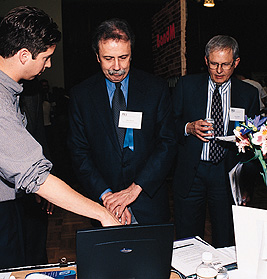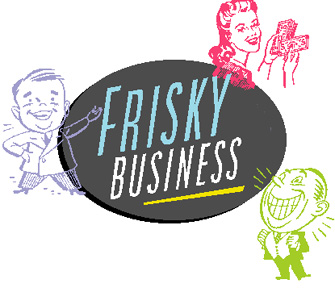Student Entrepreneurs Gain the Experience, Contacts and Confidence Necessary to Launch Their Own Companies.
By Brad Broberg
From the stairwell, the voices sound like a distant river. At the doorway, they grow to a dull roar. Finally, as if rounding a bend and finding a waterfall, you enter the HUB's West Ballroom and the noise becomes a torrent--raw capitalism at full churn.
Inside, 35 teams of business students from four universities are striving to make a splash. And with good reason. They are pitching business plans--everything from a drive-up video store to a funeral parlor co-op--to people who could help any one of them become the next Bill Gates ... or at least the next Pete Findley.
Findley, '98, may never match the Microsoft mogul's billions, but this University of Washington graduate already has a place in history. Findley and his former partner and classmate, Alexa Ingram-Cauchi, won the University's first Business Plan Competition last year. Since that time, Findley has built their contest entry, Cybercamps, into a multimillion dollar business.
On this gray day in May, UW student Jonathan P. Nicholas is trying to be the next Findley--and pocket a $25,000 first prize.
His booth is part of the "investment round" of the 1999 Business Plan Competition, the marquee component of the UW's burgeoning Program in Entrepreneurship and Innovation (PEI).
Students are crammed into the HUB with their elaborate booths to display, demonstrate and describe their projects. They also prowl the ballroom floor in pursuit of the bankers, business owners and venture capitalists who are judging the contest.
Nicholas is working the room like a highbrow carnie. Clad in a dark blue suit with a white handkerchief tucked into his breast pocket, he spots Bill McAleer cruising between booths.

PEI judges assess one student entry.
The purple ribbon attached to McAleer's name tag is like blood in the water. It means the Seattle venture capitalist is one of the 50 judges toting $1,000 in fake "PEI money." After visiting the booths, judges "invest" in the companies of their choice. The 16 firms gleaning the most PEI dollars advance to the next round.
McAleer, managing director of Voyager Capital, has done his homework, reviewing summaries of each contestant's business plan and taking note of those worth visiting during the HUB's hubbub.
Arts Patron Magazine--the brainchild of Nicholas and his partners, Andrew Tempest and Matthew Carr--was not on McAleer's list. But even the best-laid plans of a successful venture capitalist are no match for a budding entrepreneur's bravado.
Clutching a full-color mockup of the magazine, Nicholas intercepts McAleer as he is headed to another booth. "Bill," he shouts as he sticks out his hand, gives a firm shake and makes his pitch. Arts Patron will be a lifestyle magazine distributed free to members of various arts organizations such as the Seattle Symphony and Pacific Northwest Ballet, Nicholas explains, and will draw advertisers coveting a Mercedes-driving, Chardonnay-sipping audience.
Despite the pitch, Nicholas didn't get much of McAleer's PEI money. "I gave him a little bit, mainly because he had a lot of chutzpah," he explains later. "I gave more to a couple of others."
